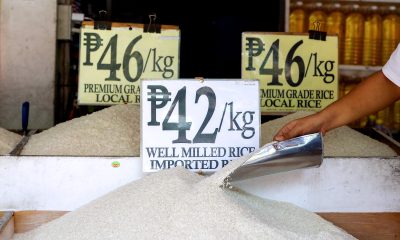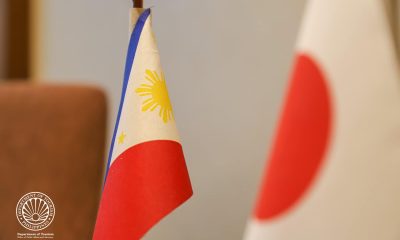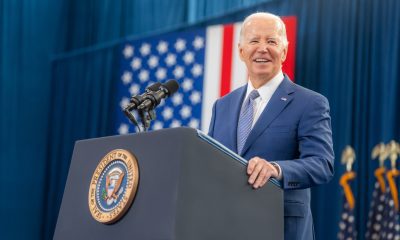Canada News
Canada quietly marks 10 years since troops left Afghanistan

Canada’s chief of the defence staff, Gen. Wayne Eyre, speaks at a ceremony at the National War Memorial in Ottawa on Sunday, marking the 10th anniversary of the withdrawal of Canadian troops from Afghanistan. PHOTO: (JEAN-FRANCOIS BISSON/CBC)
Afghanistan left few in the military and their families untouched, says top commander
It has been said that Canada’s war in Afghanistan grabbed hold of a generation of soldiers, diplomats, aid workers and even journalists and never quite let go.
That notion was on full display Sunday as several dozen veterans and dignitaries gathered on the cold, rain soaked square around the country’s national war memorial in Ottawa to mark the 10th anniversary of the withdrawal of troops from the long-suffering South Asian nation.
It was an understated ceremony, much like the one a decade ago in Kabul when the Canadian flag was hauled down for the last time at the NATO-led International Security Assistance Force headquarters.
Back in 2014, no government ministers attended the ceremony and the public initially learned the news of the final withdrawal from the training mission via press release on March 12th as the last troops boarded helicopter, the first leg on the long journey home.
WATCH | Ceremony marking 10 years since the withdrawal from Afghanistan:
CANADA MARKS 10 YEARS SINCE THE AFGHANISTAN MILITARY MISSION’S END
Ten years after Canadian troops pulled out of Afghanistan, the Canadian forces held an understated ceremony in Ottawa to pay tribute to the lives lost and reflect on the lessons from the nation’s longest war.
On Sunday, the country’s veteran’s minister and the parliamentary secretary for defence attended along with a smattering of soldiers, veterans and families of the fallen. There were, however, many empty chairs, partly a reflection of the weather and partly the occasion itself.
Afghanistan experience has left none untouched,
said Gen. Wayne Eyre, the country’s top military commander, Many — including families — were scarred physically, mentally and morally from it. Many of us have asked and have been asking, ‘Was it worth it?’
Taliban resurgence
While Eyre acknowledged it is a deeply personal
question. It has become more sharp — even painful — since the fall of Afghanistan to the Taliban in 2021. In reimposing their brutal theocracy, the once virulent insurgent group has swept away almost everything Canada and its allies fought to achieve.
But we can hold our heads high knowing that we did everything that our government asked us to do,
said Eyre, who led a team of Canadians in Kandahar who embedded with and taught Afghan soldiers how to fight. Our members served with valour and selflessness.We were there to make a difference, and they did.
The swift collapse of the Afghan National Army (ANA) in the face of the resurgent Taliban was an enormous blow to not only the Canadians, but other allies, including the United States and United Kingdom. NATO countries invested billions of dollars and hundreds of lives in the attempt to build up the fledgling fighting force.
The disintegration of the ANA — like everything with Afghanistan — was brought about by a complicated set of factors, including the bribery of key tribes to withdraw their support from the government, the inability of the U.S. to sustain the Afghan air force and the incompetence of some of the ministers appointed by former president Ashraf Ghani.
Royal Military College professor Sean Maloney said it was remarkable how little attention Canada paid to Afghanistan after 2014, with the exception of cutting cheques to sustain the security and humanitarian effort.
What he found, which he described as utterly fascinating,
was that by 2016 the Taliban and other insurgent groups were largely on the ropes and riven by in-fighting. It wasn’t until the Trump administration began negotiations for a peace deal that the militants united with new purpose and energy.
It’s only when the decision is made or the announcements or the discussions take place about pulling the Americans out that things appear to ramp up, all of which led to the results of 2021,
said Maloney.
It is, he said, an important consideration when Canadians look back and evaluate whether the effort and the expenditure of lives and money was worth it.
A national conversation about Afghanistan?
Maloney said he doesn’t think Canadians will ever be ready for a national conversation — either politically or socially — about the Afghan war. He said the public, politicians and the country’s institutions don’t like to talk about wars, conflict and sacrifice, unless it is — like the Second World War — in the distant past.
Have we come to grips with Somalia? Have we come to grips with Rwanda?
Maloney asked in reference to failed peacekeeping missions in the 1990s.
Canadians, he said, don’t even understand what troops did on successful missions, such as the 1993 Battle of Medak Pocket, where they largely prevented a genocide from taking place.
So, if we’re expecting to come to grips with Afghanistan, and we haven’t even discussed all of these other things that took place in the decade beforehand, then how can we have a conversation?
Maloney added he’s not even convinced of the utility of having a discussion
about the Afghan war because people just don’t want to know because, if they find something negative, it might have an impact on their current political agenda.
Maloney spent more than a decade fighting an uphill battle with the Department of National Defence to get his three-volume history of the Canadian Army in Afghanistan published.
Bigger questions about war
Eyre, however, disagrees and believes in the current context with wars raging in Ukraine and the Middle East, a national conversation about how and when Canada goes to war is imperative.
The reluctance to face the past is understandable, says an Afghan-Canadian journalist who fled the country a couple of years before the Taliban resurgence.
Frozan Rahmani said Canada’s legacy was a mixture of good and bad, as with any war.
There is perhaps some solace in the stories of individual Afghans, whose lives were made better — or were irrevocably altered, such as her own.
When Canada intervened in Afghanistan with the international commitment, I was a teenage girl who had been banned from school for almost five years due to an oppressive and dark regime,
said Rahmani, who fled to Canada not because of the Taliban, but because of threats from corrupt warlords.
With Canada’s intervention, I was able to go back to school and it gave me a sense of freedom and hope. It was like a new beginning for me. I got a chance to pursue my education and work towards a better life.
Murray Brewster (new window) · CBC News
This article is republished from RCI.





















